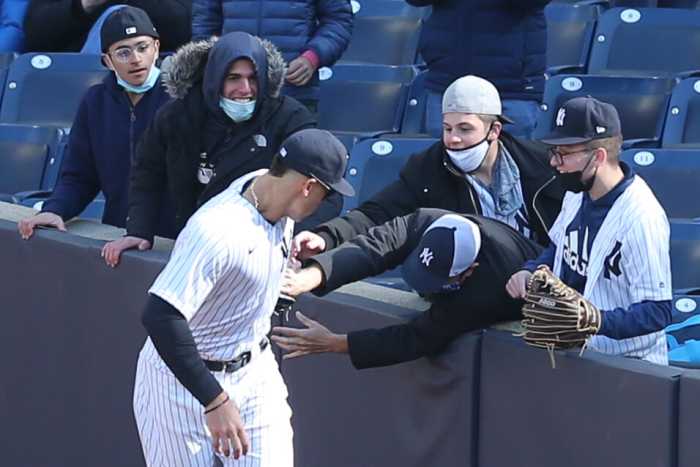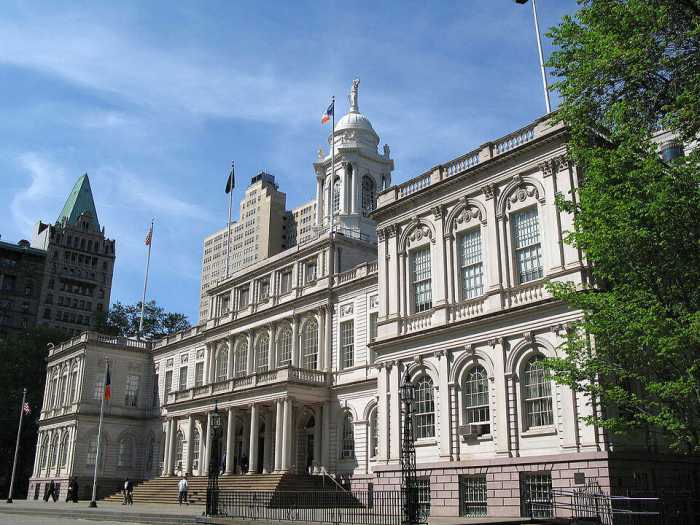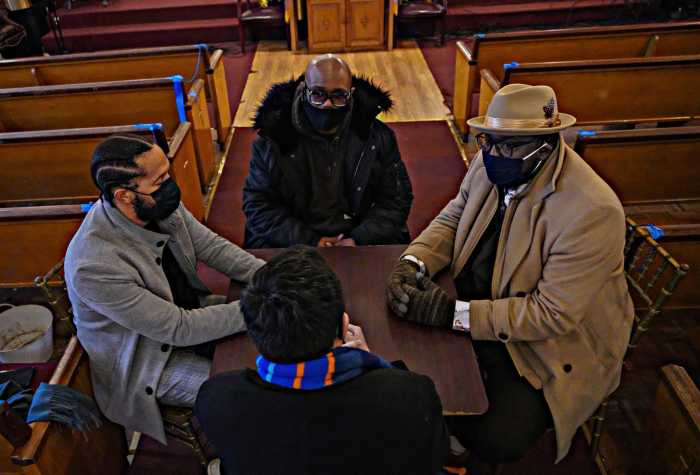New York City voters headed to the polls to vote in the primaries on Election Day, June 22, casting their ballot for who will likely be the next mayor along with several other local political races.
In Downtown Manhattan, a trickle of residents did their civic duty at their local poll site in the basement of Church of St. Anthony of Padua at the Greenwich Village-SoHo border Tuesday morning around 8 a.m.
Villager Juanita Gilmore said she preferred coming out to perform her civic duty on Election Day rather than vote early or by mail.
“I like the drama of the Election Day because it’s the day. It’s the day to do it and there’s kind of an excitement about it,” said Gilmore, just before she headed to the voting booths.
Her pick for the city’s top job is Comptroller Scott Stringer, who she said was more qualified than frontrunners Brooklyn Borough President Eric Adams and entrepreneur Andrew Yang.
“We’re coming out of a pandemic and you need someone who knows and understands the city and having the comptroller, he understands and he knows,” she said. “As much as I like the comments from Yang and Adams, I find them both quite unqualified.”
One area driving instructor said Adams was his first choice, due to the Brooklyn borough president’s life experience as a former NYPD captain and his union endorsements.
“I figured give him a chance,” said Glenn Colson.
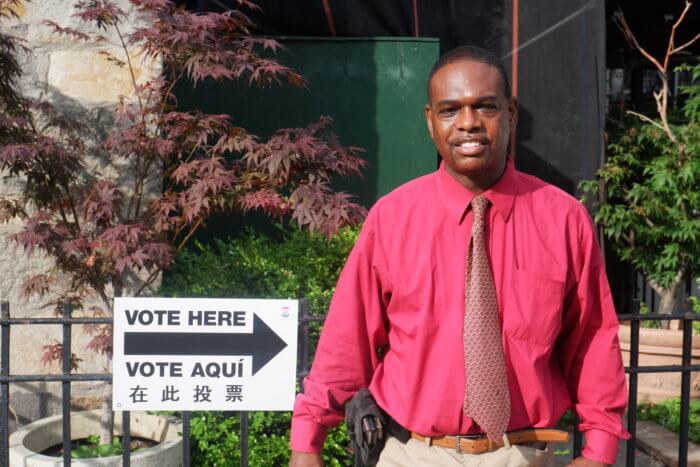
A whopping 15 candidates are on the ballot for mayor, including 13 Democrats and two Republicans, and New Yorkers will also be able to vote for comptroller, public advocate, city council seats, along with a new district attorney in Manhattan and several judges.
In a city that is overwhelmingly blue, the Democratic nominees are in all but a few local districts highly likely to win the general election later this year.
Almost 300,000 people already voted before Tuesday, including 191,197 who early voted from June 12-20 and 90,763 who returned their absentee ballots, according to the city’s Board of Elections.
This election marks the citywide debut Ranked Choice Voting, which allows voters to rank up to five candidates in order of preference for the municipal races.
If a candidate gets more than 50% of first-choice votes, they are automatically the winner.
If no one earns more than half the votes, BOE will continue counting in rounds and at the end of each round, the person with the fewest votes is eliminated, a process that continues until there are only two candidates left and the politician with the most votes wins.
Ranked-choice voting was approved by a 73.5% majority of voters in 2019 and advocates praise the system for giving upstart campaigns a better shot and for avoiding costly runoff elections.
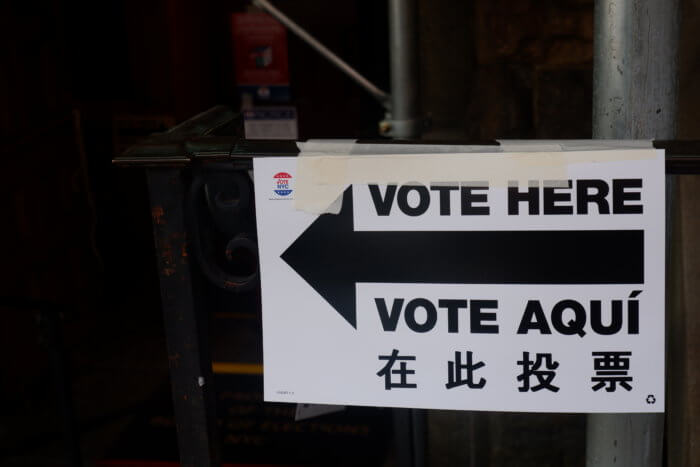
The new system and the large amount of absentee ballots mean that it will take weeks before the city knows who won the elections.
BOE will release unofficial results of only the first ranks of in-person votes from Election Day and early voting at the close of the polls Tuesday night at 9 pm.
On June 29, the board will release preliminary results including Ranked Choice Voting tabulations for in-person voting, followed by an updated tally with absentee ballots on July 6.
BOE doesn’t expect the final results until some time around July 12, almost three weeks from now.
The ranking met with mixed reviews in Manhattan, where one SoHo resident said he just voted for one person: Eric Adams.
“I refuse to do that, I didn’t do it,” said Owen, who declined to give his last name. “I don’t want to help someone else get elected who I don’t think is the best so why would I vote for them second or third.”
A fellow SoHo resident also found it complicated but liked trying something new.
“It’s kind of tricky, it’s new, but I’m for innovation,” said Cesar Vasquez.
Vasquez, who was about to head to the poll booth, said he wasn’t sure yet who he’d vote for and that he waited until the last day to give him enough time to do his due diligence.
“I usually make my decision when I walk in there, but we need energy, somewhere between old and young, somewhere in the middle, we need the experience,” he said.
But the Manhattanite was sure of one thing:
“I think New York always comes back,” he said.
Ranked-choice woes in Harlem
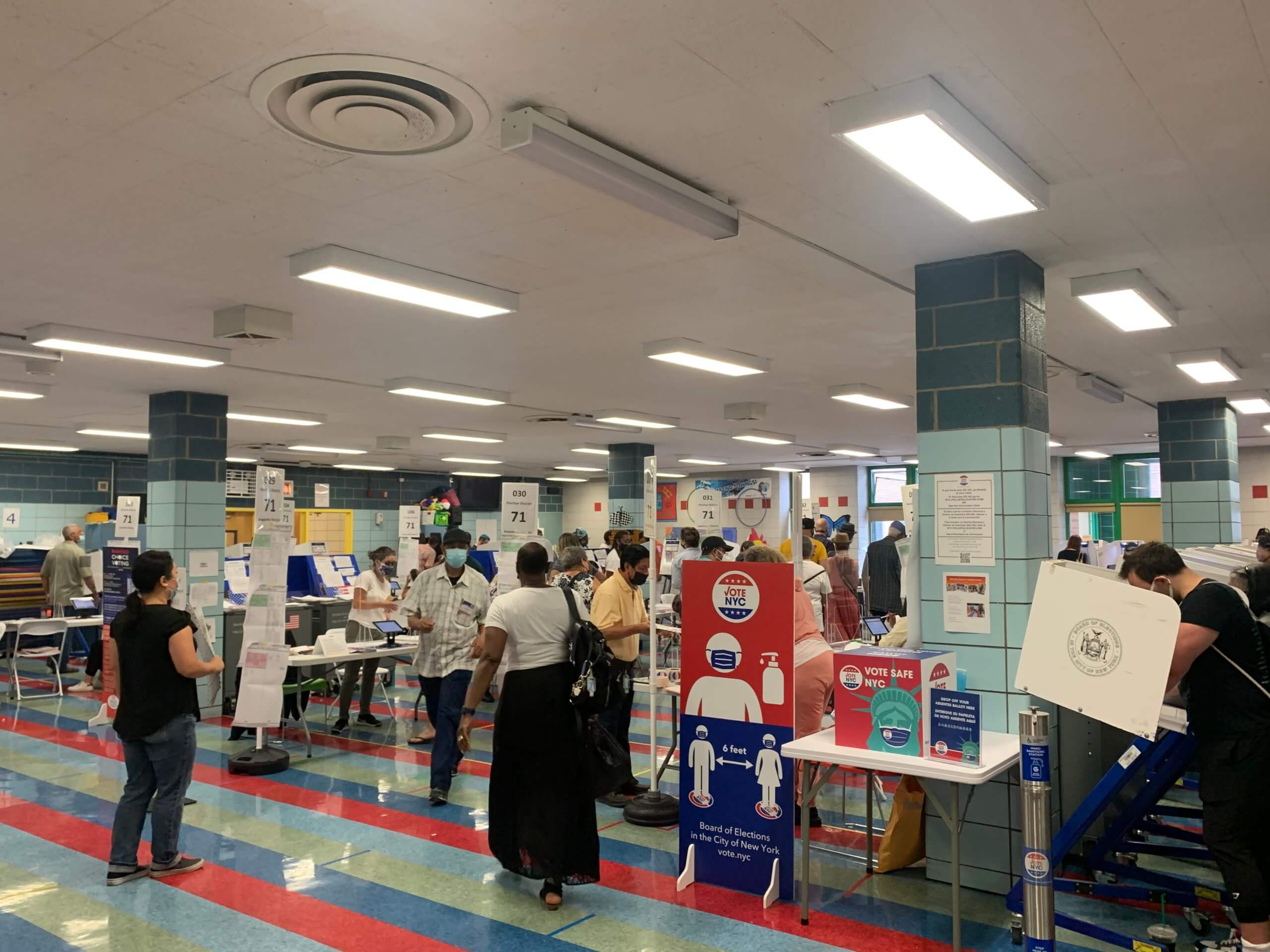
At P.S. 153/the Adam Clayton Powell Elementary School polling site on 147th Street and Amsterdam Avenue in Harlem, voters streamed in alongside children attending school for the day.
This is the first time ranked-choice voting is being used in New York City, and its implementation has been a hot topic in the final days of the contest. Alexandra Johnson, 27, a poll worker at P.S. 153, said ranked-choice voting has given some voters issues.
“I heard a few people saying it was hard in passing,” she said.
Johnson arrived at 6 a.m. and will be there all day until polls close at 9 p.m. She said that this far there has been a steady stream of people voting.
“It’s not like how it is on a national level, but there has been a steady stream of people all morning,” said Johnson.
Voters of all ages were at the elementary school turned poll site. Besides mayor, the electorate is being asked to cast ballots for comptroller, borough presidents, various City Council seats and the Manhattan District Attorney, and civil court judges. Still, many showed up to mainly focus on the mayoral race.
“I woke up early and came to vote for Maya Wiley today,” said Adrian Benjamin, 23. “I like her vision for the city and wanted to support her.””
Benjamin added that he also ranked two other candidates for mayor, Eric Adams and Andrew Yang.
“I thought there was a good crop of candidates in this election so it was nice to have choices,” said Benjamin.
While many voters choose to support candidates based on their policies and plans, some like David Sanchez, 33, choose to vote for candidates who represent them ethnically.
“I only ranked Eric Adams number one,” said Sanchez. “I think we need a Black man in office, I think that’s important to have someone who can represent me and people who look like me.”
Sanchez said that the other races weren’t as important to him, but he voted for the candidates he felt would do the best job for the city and represent the voters effectively.
“There are a lot of issues people are dealing with and we need leadership that’s going to fix things.’
Chris Urgiles, 46, is another voter who came to vote for Wiley. He says having a progressive in the mayor’s office is crucial to the City’s recovery from the pandemic.
“We were hit hard and I just feel like we need big ideas to not only get us back to where we were but for us to also move forward too.”
Translation issues in Chelsea
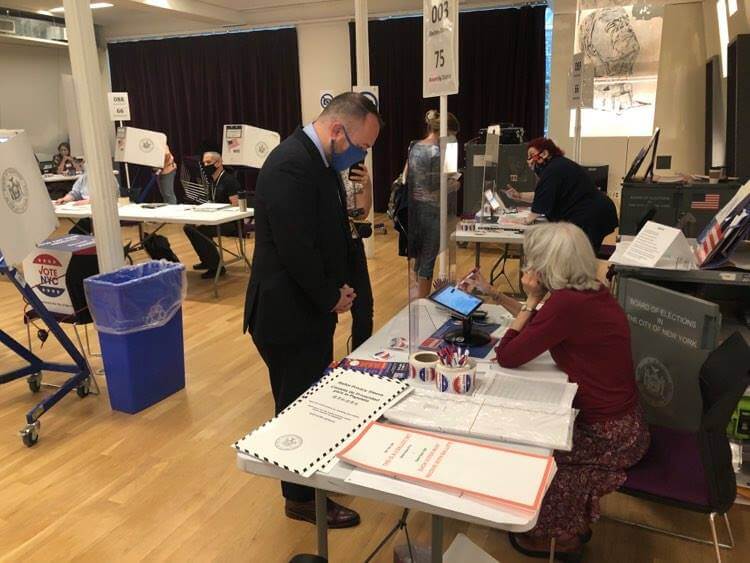
The pace of voter turnout at The Lesbian, Gay, Bisexual and Transgender Community Center on the Chelsea/Village border was slow but steady. Poll workers reported the only time there was any line was right before doors opened at 6 a.m.
The only issue reported was a lack of interpreters at the site. Poll workers said they were missing a Spanish language interpreter and a NYPD officer stationed inside at one point had to serve as an impromptu interpreter for a solely Spanish-speaking voter.
A poll watcher told the site’s coordinator to take down the sign in front of the Center stating that interpretation services were available in Spanish.
For Terry Kaufman, 63, casting her rank-choice ballot at The Center in The Village was quick and easy in part because she did not rank five candidates when voting for mayor. Kaufman told amNewYork Metro she wished she was “more excited about more of the candidates” but happily cast her vote for her “clear” top choice, former Commissioner of the New York City Department of Sanitation Kathryn Garcia who won her support mainly because of her vast experience running such a large city agency.
“I think she has the respect of a lot of agencies in the city that she would be able to work with,” Kaufman said. “She knows the people of the city and how the city works…I think she is really interested in doing her job, she isn’t interested in power, she’s not interested in being in the spotlight and her record shows that she can do a good job.”
In addition, she said she believes that as a less extreme progressive compared to some of her fellow candidates, Garcia will have the respect of the NYPD, potentially making the future rollout of police reform easier as mayor.
A fellow fan of ranked-choice voting, Chelsea resident Juliet Pope, 53, excitedly stopped by Hughes High School on W. 18th St. to drop off her absentee ballot.
“I think it’s an excellent, excellent idea,” Pope said. “It means all of our votes count more in a sense.”
Pope requested an absentee ballot weeks ago thinking she would be out of town during Tuesday’s Democratic primary. Her plans changed but she was happy to have an early ballot nonetheless so she could take her time and be thoughtful in her choices. She too ranked Garcia as her first choice for mayor and chose Brooklyn Councilmember Brad Lander as her top pick for New York City Comptroller.
“Whoever takes this job will be in office during a very transformative time and a vital time for the rebirth of our city,” said Pope about the new mayor of New York City. “Although she is not as progressive as I might believe myself, I feel like she is a get-it-done kind of gal.”
Although Pope did not have any challenges understanding rank-choice voting, she has seen other voters struggle with the concept and blames confusion on the New York City Board of Elections’ lackluster effort to explain the process to New Yorkers.
“They could have done a hell of a lot more to promote it, explain it, publicize it,” she said. “It should have been on every one of these Wi-Fi stands when you walk down the street, it could have been on every billboard, it should have just been plastered all over the city.”
Poll sites are open until 9 p.m. on June 22. You can find your local poll site at findmypollsite.vote.nyc




